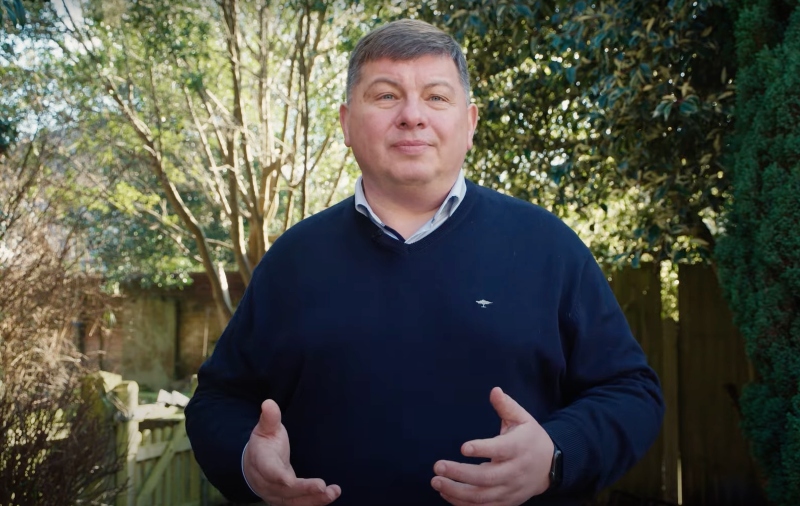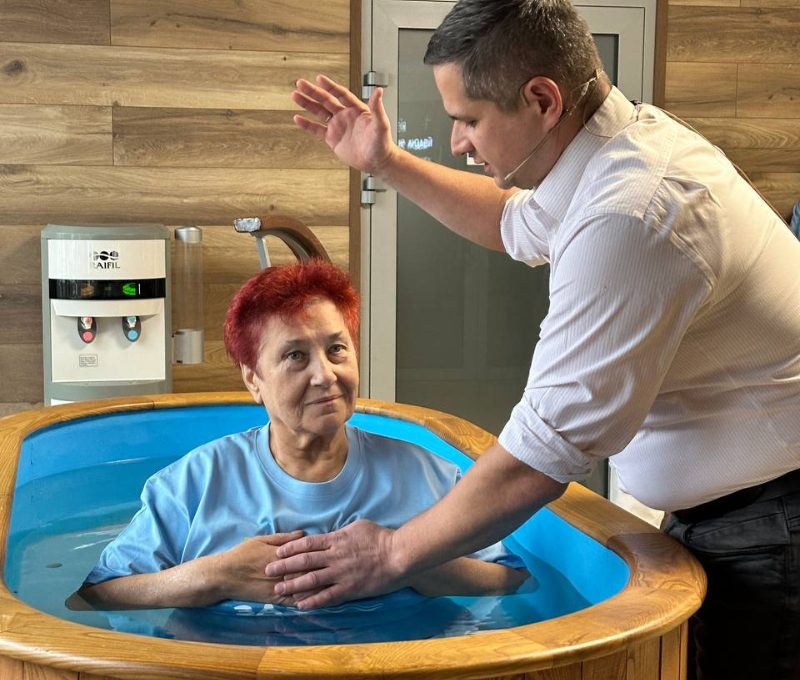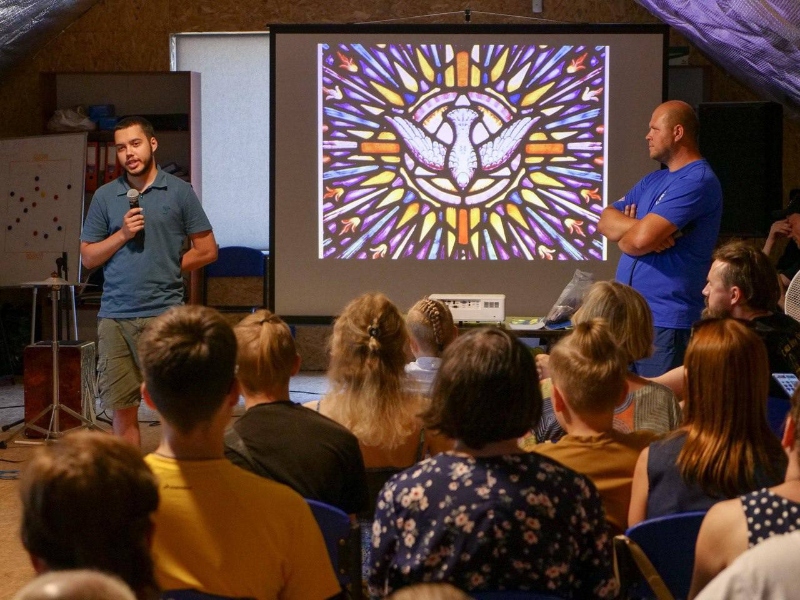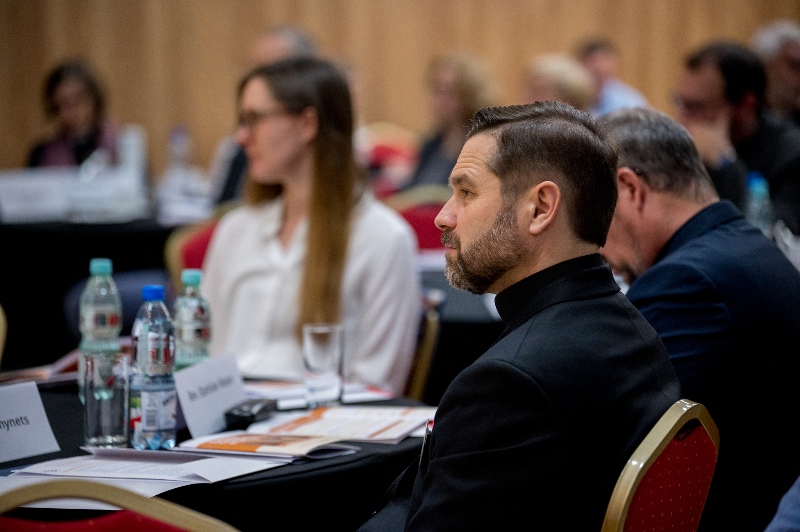Practical, prayerful – how Baptists have responded to the war in Ukraine
An interview with Igor Bandura, Vice President of the All-Ukrainian Union of Evangelical Christian-Baptists
Igor has also prepared a short message for churches, and shares four prayer requests
Access the two min video on YouTube here, or download here
 ‘Pastor, I would like to confess - I came to your church, not because I was looking for God – but because I was hungry.
‘Pastor, I would like to confess - I came to your church, not because I was looking for God – but because I was hungry.
‘I have no money and no bread. My neighbour told me to go the church: she said they feed people there. So I came and they gave me bread.
‘I came a second time. Again it was because I was hungry. I came only to take the bread.
‘But then I saw people were staying, to read the Bible. They were spending time together, and I wanted to stay.
‘It was then that God touched my heart. And now I’m happy to be baptised.’
 A baptism in Irpin
A baptism in Irpin
The account is shared by Pastor Igor Bandura about an encounter he had with an elderly woman at his home church in Irpin.
Igor, Vice President of the
All-Ukrainian Union of Evangelical Christian-Baptists, says it’s a story replicated ‘thousands’ of times since the full scale Russian invasion. Annual baptisms across Ukrainian Baptist churches have increased from 2600-2700 to 3000-4000 since 2022. One pastor calls those he has baptised ‘children of war’.
Just like the elderly woman, many have responded not only to the care shown them by Baptist churches, but also to the faith in God of their people.
‘When we come together, when we read the Bible, when we pray together, it's different,’ Igor says. ‘We support each other, and then people come to feel this.’
‘War is brutal’
Living in a country under attack is ‘brutal’, Igor explains. Death and destruction stalk the country. Every two or three days something is hit by a drone or missile, and there has been ‘unspeakable suffering’.
Igor tells the story of a Baptist family living in an apartment block in Odessa who went to bed one night, the mother with their baby in one room, the father with an older child in the second bedroom. A blast wiped out half of the apartment, killing the mother and baby. Ukrainians are living under ‘constant threat’, with no place anyone can feel secure. The gruelling frontlines means the number of orphans and widows grows daily.
War impacts everyday life, for air raid sirens are a daily and disruptive reality. When one sounds, everything must stop. You could be in a shelter for half an hour, or up to eight hours, Igor says. This has had huge implications for all aspects of life, not least education. ‘Schools, colleges, universities – it’s a terrible state.’
Everyone has their personal pressures. Igor’s children are now at conscription age, and he and his wife live with the very real possibility of their call up to the frontline. ‘I think about this constantly,’ he shares. ‘If they go, I might not see them again.’ Their home is in Irpin, focus of a devastating siege in the early stages of the war. It survived, but not without much cross-fire damage.
This is but one family. And as with the baptisms, it’s a testimony replicated in similar ways across the whole of Ukraine. More than 12 million people have lost their homes and became internally displaced persons (IDPs). More than 8 million families have been separated for over 1,000 days.
‘If we ask how many people are traumatised by war,’ Igor continues, ‘then the answer is everybody.’
The response of the church: a practical people…
Though Baptists were shocked by the start and scale of the invasion (‘right until the last day we hoped that somehow we would be protected’ Igor says), they were well prepared.
‘One month before the war, we developed a plan, such as connecting churches in the east with those in the west, so those fleeing knew where to go.
‘We organised everything.’
It meant Baptists hit the ground running in terms of the relief efforts, and this has continued in the three years since. Many churches have become community centres and coordinate activities to meet people’s basic needs. Igor explains they are involved in food and cash distribution, mobile kitchens, fuel provision and trauma healing projects. While there are just 13 official army chaplains, around 400 Baptist pastors act unofficially as chaplains, visiting ‘stabilisation’ centres (where injured soldiers go) and do what they can to support the people there.
This recent Facebook post on the official Ukrainian Baptist Union feed shares how a Baptist church in Zaporizhzhia actively serves internally displaced families
Nevertheless, Igor is keen not to give the impression that despite the war, Baptist churches are ‘really thriving and everything is fine.’
‘There are many, many problems,’ he stresses. ‘People really need a lot of support.’
Hundreds of church buildings have been destroyed. While some have been hit indiscriminately, others have been targeted deliberately as an attempt
to erase Ukrainian identity. Churches in the occupied eastern regions can exist, provided they cooperate with the Russian state and worship conforms to the state-aligned Russian Orthodox Church.
Many churches have closed as pastors and their people have escaped the fighting and persecution. Some have established new churches in the places they have fled to – 50 new churches appeared in the first two years of the war, while another 25 are in the process of formation. Ongoing financial support of pastors to the tune of $100 a month is a key aspect of the Union’s response.
‘Pastors are key, key to organise and to lead the church,’ Igor explains. ‘Some left everything and lost not only their job but their house. So we wanted to keep them in ministry - we need to keep them in churches.’
Despite all the problems they have faced, Baptist churches have made a tangible difference.
‘Generally speaking, I am very proud of Ukrainian Baptist churches,’ says Igor. ‘I am proud of their perseverance and their faithful ministry.’
… and a prayerful people
And it is this latter point – their faithful ministry – which is key to understanding the Ukrainian Baptist response to the war. Igor stresses that Baptists are not only a practical people, but a prayerful one. Throughout the suffering of war they have remained focused on the Gospel. ‘It’s our unchanging strength and a source of inspiration and understanding,’ he says.
So alongside the practical, there’s emotional and spiritual provision through the mutually supportive Christian communities, Bible study and prayer. It’s been met with an openness as people seek hope and answers to life’s hardest questions.
 Kryvyi Rih, central Ukraine
Kryvyi Rih, central Ukraine
‘We cannot provide positive news, but we can speak about God, and we can speak about hope,’ Igor says. ‘We believe that God will not forsake us.
‘I felt like I have only one obligation every time I preach – and that is to share hope.
‘It's not that we are special - but we are a people of hope.’
European Baptist Union General Secretary Alan Donaldson has worked closely with Ukrainian Baptists, particularly in the early months of the full-scale invasion.
Speaking at the 2022 Baptist Assembly, he shared this:
In the face of unspeakable evil and the most awful disorientation in their homeland, Ukrainian Baptists returned to their roots and abided in Christ. With bombs, shells and mortars landing around them, they have sought refuge in church basements and simultaneously sought the presence of God. It’s been central to their response to war: abiding in Christ’s presence by reading scripture together, finding reasons for thanksgiving together, praying together, entering the discipline of gathering together to eat bread and drink wine, baptising new believers.
It is here in connection with one another they testify to experiencing the presence of God in the midst of great conflict. They have received and appreciated the love and joy of Christ by gathering together.
They have then daily left the safety of these basement churches to serve their communities. Ukrainian Baptists travelled from Lviv to Kyiv to deliver aid; they attempted to gain access to Mariupol; they walked the frail and elderly from the basements to buses in Irpin amidst shelling, and some have lost their lives rescuing the vulnerable.
The whole people of God have participated in the mission of God. Out of the security of dwelling in Christ, out of the abundance of being found in Christ, they have entered the insecurity of a war zone, and poured out their lives in service and sacrifice.
‘We have ministered to our community during the war,’ Igor says, ‘and this is why churches have really become the places of God's love.
‘The question we often ask is: where is Christ in the midst of the world?’
‘And the answer is… in the trenches, in the hospitals… and in our churches.’
Conscientious objectors in Ukraine
Igor visited England in late January as part of a delegation of religious leaders aiming to bring attention both
to the religious persecution in the occupied territories, and to the plight of conscientious objectors in Ukraine. Prior to the full-scale invasion, there were alternative service options for conscientious objectors, at double the length of service time. They could choose to work in a hospital, or be a driver, for example. For every solider on the front-line, there are eight people in supportive non-combatant roles, Igor explains.
However, with the country at war, this option is no longer the case. Igor and his counterparts are seeking to raise awareness of this, and met Government officials in both London.
Ukrainian Baptists debated the issue at a conference in 2014, and voted unanimously to allow for individual freedom of choice.
Ukrainian Baptists therefore do not encourage refusal of military service – if people choose to go, they go knowing they are loved and prayed for by their Baptist community – but for those who would prefer to choose non-combat roles, they can expect their Baptist family to stand beside them advocating for their right to do so.
A just peace
In his prayer requests, Igor speaks of a 'just peace'. What does that mean for Ukrainians?
In December, the Ukrainian Council of Churches and Religious Organisations shared insights with a European Consultation on
how Ukrainian churches perceive the concept of just peace.
The three day conference was guided by Amos 5:24: 'Let justice roll down like water and righteousness like an ever-flowing stream.'
The Revd Anatolyi Raychynets, Vice-Chairman of the Ukrainian Council of Churches and Religious Organisations, and Deputy General Secretary of the Ukrainian Bible Society, described seeing the “Russian world” come to the territories of Ukraine.
 The Revd Anatolyi Raychynets | CEC|Łukasz Troc
The Revd Anatolyi Raychynets | CEC|Łukasz Troc
'Church buildings taken for the needs of the Russian army, a ban on holding church worships, killed clergy, tortures,' he said.
'Therefore, we, as ministers of the church, ask for something that is not typical for pastors – we ask to help Ukraine with weapons and everything necessary so that the defence forces of Ukraine can protect the lives of children, women, and all people, because they came to kill us.'
That, Raychynets said, is what just peace means to him.
'Exactly a just peace,' he concluded. 'When evil is punished and justice is restored.'
Advocacy in Washington
Following his visit to London, Igor travelled to Washington DC as part of a delegation of the Ukrainian Council of Churches and Religious Organisations to participate in Ukrainian Week (3-8 February). The delegation was also represented by Valeriy Antonyuk, President of the Ukrainian Baptist Union.
The week involved a series of meetings where support for the Ukrainian state, the reconstruction of the country, and a just peace were discussed.
According to
a report on the All-Ukrainian Union of Churches of Evangelical Christian Baptists website, the Ukrainian religious leaders participated in the fifth International Religious Freedom Summit, where they spoke about 'the state of religious freedom in Ukraine, the Russian Federation's religious persecution in the temporarily occupied territories of Ukraine, and about the Kremlin's use of religion in its hybrid war against Ukraine and the free world.'
The summit was addressed by US Vice President JD Vance, who emphasised the importance of the principles of religious freedom at the international level.
The delegation was also part of the National Prayer Breakfast of the United States. Here US President Donald Trump stated he would create a commission on religious freedom and an office of faith affairs in the White House.
The week saw them meet Speaker of the US House of Representatives, Michael Johnson and his senior advisers, 'to discuss the need to continue supporting Ukraine in countering Russian aggression.'
“Pray for the end of the war - with a just peace.”
In this short video, Igor Bandura shares a message with the UK church - and four prayer requests:
Top image | Baptists Together/Fuelcast
All other images All-Ukrainian Union of Evangelical Christian-Baptists unless stated
Baptist Times, 19/02/2025